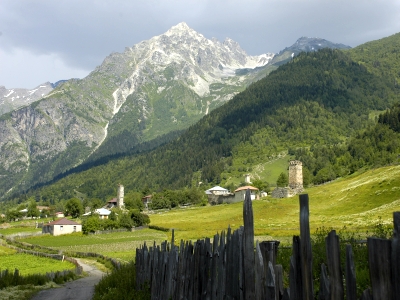Majestic Mountains, Beguiling Towers, And Lawless Bandits, Oh My
With the disappearance of the lawless bandits and random kidnappings, what’s the most likely reason for not returning home? Try not wanting to leave.
Our friend back at the embassy in Tbilisi dutifully passed on warnings from higher-ups advising us not to go or, if we were so intrepid, to at least hire a guide. They warned us about the bandits and we listened to stories of foreigner kidnappings that went in one ear and out the other. We had done our research and decided the quest was worth the minimal risk we thought it posed to our safety.
The place in question was Svaneti, a sparsely-populated, high-altitude region of the Republic of Georgia, sandwiched between the infamous conflict areas of South Ossetia and Abkhazia. We read that the situation had grown so bad that back in 2003, after a wave of increased murders and robberies of foreign tourists, the Georgian Interior Ministry deployed a special-purpose unit to restore order in the Mestia District.
At dusk we boarded the overnight train at the Tbilisi station and shortly after dawn we rolled into the drowsy town of Zugdidi. We made our way to the makeshift bus station. Here we hesitantly handed over our passports to buy the tickets for the next part of the journey.
The woman behind the kiosk registered us as foreigners entering Svaneti and assured us there hadn’t been any kidnappings in over four years. After waiting an hour we lashed our backpacks to the rack on the dented roof and boarded the rusting van, squeezing ourselves onto one of the ripped-upholstery benches. Most of the next four-and-a-half-hour haul would wind us through a river gorge ascending past several shades of greenery.
Despite the early hour, my inquisitive and uninhibited travel partner struck up a conversation with the mixed-age crowd crammed inside the van. As the roads deteriorated, those on board became friendlier. They were teaching us some basic words in Svan, a South Caucasian language spoken only by some 30,000 inhabitants of the region. Having no written language, most Svans know Georgian and a smattering of Russian, which became our common tongue.
The unforgiving jolts and jerks of the partially paved road abruptly came to a halt. The van stopped. Everyone fiddled through his or her bag for an empty plastic bottle. Stepping out into the sunshine we stood confused, watching our new friends make their way down to a small stream.
One by one they bent down and filled their bottles from what looked to be the source of a stream. It was a spring bubbling out of the ground. “Good water?” I asked a man in my newly acquired Svan. He smiled, assuring me it was safe to drink. We couldn’t believe the water came out of the ground already carbonated. And like it or not, the mineral water in these parts has a salty, sulfur flavor that is certainly an acquired taste.
 After driving another 30 minutes slowly up the gentle grade, we entered Upper Svaneti. Here huge stone watchtowers appeared, rising out of the landscape. It seemed like most houses in the villages that speckle this long, scenic valley had one. They were mostly built in the 9th to 12th centuries to store grain and provide safety for the families from attackers. Behind the villages, in the near distance, a series of 15,000-foot mountain peaks loomed over us.
After driving another 30 minutes slowly up the gentle grade, we entered Upper Svaneti. Here huge stone watchtowers appeared, rising out of the landscape. It seemed like most houses in the villages that speckle this long, scenic valley had one. They were mostly built in the 9th to 12th centuries to store grain and provide safety for the families from attackers. Behind the villages, in the near distance, a series of 15,000-foot mountain peaks loomed over us.
Upon arrival in Mestia, the regional capital, we navigated through the town’s few streets with the help of some residents and found the family with whom we would be staying. They were pleasant, and after a cup of tea and brief chat to get acquainted, we strolled through the wide, Soviet-era streets, past the empty main square and made our way to the regional museum.
The next morning our host packed us a generous lunch and we set off for an ambitious walk. We hoped to make it to Ushguli, the highest continually inhabited village in Europe. To manage the some 40 kilometers, we would need the help of a passing vehicle for a lift.
We kept our expectations to a minimum, and with that mindset we weren’t disappointed — no cars ever passed us, on this, the only through road in Upper Svaneti. But it was all for the better. At our pace we slowly absorbed the alpine scenery: wildflower-drenched fields, a quick-flowing river, sounds of cow-bells, and sights of inviting villages along the way, all with the uneasy thought of bandits still in the back of our minds.
Soon we started climbing up the switchbacks, still with no sign of any passing cars. Almost to the pass, we came upon the calmest of ponds in a picture-perfect setting. We unpacked our lunches and ate while sitting beneath the stunning mountain backdrop.
After lunch we finished the climb to the pass and looked out into the next valley. We stood in silence. The huge expanse in front of us stifled any words that might have come out. With Ushguli only a spec on the horizon, we realized it was too far and turned around with regret.
Coming down from the pass, we saw the village of Saldashi, with its old-fashioned homesteads surrounded by large plots of land and rickety picket fences, just a few hundred meters to the north. We wandered up the dirt road and saw an elderly couple outside of their house. We looked at them. They looked at us. Out of curiosity, they called us over.
“You boys must be hungry,” the man said in Russian, prompted by his wife who must have noticed that we looked like we’d been walking for hours.
With that we were quickly introduced to the Zredeyani couple, Kolya and Julieta. With a nice plot of land big enough to raise a couple cows, some pigs, and a sufficient vegetable garden, they sustained themselves through the harsh winters.
We sat down at the table and Julieta placed a bowl of soured milk in front of us. Without a doubt it came from their cow outside. We sponged it up with homemade bread. Kolya chatted with us as Julieta sat watching the inconsistent signal on their black and white TV.
“Is it safe around here?” we inquired.
“It’s not dangerous,” he replied. “Even all throughout the night.” Of course we were talking about the bandits. Not realizing it, he answered us regarding the general safety of the area.
We drifted outside and the light of day revealed the wrinkles of Kolya’s face that had endured these cyclical patterns for decades. Pointing to the the wall, he showed us how far the snow piles up in the winter (about 3 1/2 feet). Although only early July, they were already preparing for the six-month season.
Together we looked out from the front yard as Kolya pointed out Mount Shkhara and the names of the surrounding mountain peaks and villages. But we were heading in the opposite direction, towards the valley to Mestia. We thanked Kolya and Julieta profusely and headed back down the dirt road.
We walked quickly, knowing a solid three-hour march was ahead of us. After about an hour, two guys in an old beat-up van pulled over next to us. They waved us inside, cleared off the back seat, and we hopped in. Russian once again became the lingua franca and we managed to converse despite the clamoring suspension and clouds of dust.
“So we hear Svaneti’s a dangerous place?” we shouted over the roar of the engine.
“Aww, you can’t believe everything you hear,” they shot back. “It was a bit dangerous back during the civil war, but no more.”
He followed that by listing the name of every bandit’s name he could remember.
The conversation unexpectedly halted when we pulled over without warning. We looked at each other with furrowed brows, wondering what the problem was. When we saw them reach for their empty bottles we knew exactly why. We leapt out and sauntered down to the spring. We drank our fill of the water. It tasted different this time.
“Each one has just a little bit different flavor to it,” they informed us, referring to the unique mineral content of individual springs.
45 more minutes of shakes, bumps and intermittent conversation, we were back in Mestia.
During dinner, our home-stay host — who happened to be a local government official — talked to us about our safety and security reservations after we brought up the topic for the last time.
In fact, he explained, “Svaneti was a dangerous place some five years back. Former soldiers used to hide out and watch villagers go up to Mestia to sell their vegetables. Then they would rob the villagers full of their earnings, when they returned.” He continued. “And a van load of German tourists were fired on back in 2000.”
Shock showed on our faces.
“No one was killed,” he stressed, “but it’s been quiet since 2004 . . . After that point, the region ceased being a safe-haven for criminals. Security has tightened and since then it’s been safe for both locals and foreigners.”
Our time in Svaneti had come to a close and early the next morning we wound our way back down through the steep, tree-covered river gorge with an overwhelming impression of the sheer beauty of the landscape and the warmth and hospitality of this isolated, ancient culture.
Back in Tbilisi, we reported our return to our skeptical and curious friends at the embassy. We had survived our trip to Svaneti.

